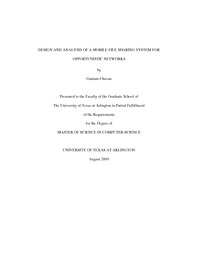| dc.contributor.author | Chavan, Gautam Ravendra | en_US |
| dc.date.accessioned | 2009-09-16T18:19:07Z | |
| dc.date.available | 2009-09-16T18:19:07Z | |
| dc.date.issued | 2009-09-16T18:19:07Z | |
| dc.date.submitted | January 2009 | en_US |
| dc.identifier.other | DISS-10322 | en_US |
| dc.identifier.uri | http://hdl.handle.net/10106/1744 | |
| dc.description.abstract | In the past several years, wireless mobile devices with advanced computing, sensing, and storing capabilities have been increasingly developed by handset manufacturers, deployed by wireless carriers, and accepted by consumers. A prominent example is the vast success of Apple's iPhone, which witnessed a sale of 1 million units during the first 3 days of sales for its new version iPhone 3GS. As a result of the increasing popularity of these mobile devices, users can carry, utilize, and exchange information embedded therein, ideally wherever they go and whenever they want. A prominent scenario is where information is exchanged among users when they are opportunistically in contact with each other while on the move. In this thesis, we propose a file sharing system for opportunistic networks, where users equipped with smart mobile devices exchange desired files or data during opportunistic contacts. Our system is based on Bluetooth, the de facto and universal standard for short range communication among mobile devices. Facing the unique challenges of opportunistic networks, namely intermittent connections and fast changing link capacity, we employ the following techniques. We introduce the concept of priority, where a user of a system can set the priority of the files for downloading. For example a user may mark the audio files as high priority, large video files as low priority, and wallpapers or images as medium priority. These files will then be downloaded according to their priorities.We introduce push mechanism where a user of a system can assign a few files for distribution. On finding peers, the system forwards the files to these peers. For example a researcher can set aside a few of his publications for sharing with other researchers, and on finding of a researcher, the system forwards the publications to the remote users.We also introduce file compression mechanism where the mobile device compresses the sharing files in order to reduce bandwidth consumption and downloading time. As a result, energy can be conserved and the lifetime of the mobile device can be extended.We implement the proposed file sharing system on a HP iPAQ smartphone, which is based on Windows Mobile. The connections between devices are established on the fly and file transfer takes place within a short span of time. If an interested file is present on more than one peer devices, simultaneous downloading is implemented to increase the overall data downloading rate.We have performed extensive experimental study to investigate the system performance in terms downloading speed, energy efficiency, and effectiveness of the techniques mentioned above. | en_US |
| dc.description.sponsorship | Liu, Yonghe | en_US |
| dc.language.iso | EN | en_US |
| dc.publisher | Computer Science & Engineering | en_US |
| dc.title | Design And Analysis Of A Mobile File Sharing System For Opportunistic Networks | en_US |
| dc.type | M.S. | en_US |
| dc.contributor.committeeChair | Liu, Yonghe | en_US |
| dc.degree.department | Computer Science & Engineering | en_US |
| dc.degree.discipline | Computer Science & Engineering | en_US |
| dc.degree.grantor | University of Texas at Arlington | en_US |
| dc.degree.level | masters | en_US |
| dc.degree.name | M.S. | en_US |
| dc.identifier.externalLink | http://www.uta.edu/ra/real/editprofile.php?onlyview=1&pid=199 | |
| dc.identifier.externalLink | http://www.uta.edu/ra/real/editprofile.php?onlyview=1&pid=199 | |
| dc.identifier.externalLinkDescription | Link to Research Profiles | |


